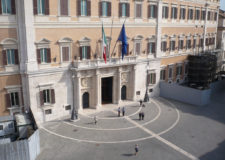Desperate times call for desperate accountants
Ernst & Young is encouraging its corporate clients to lobby governments to water down ongoing reform of the international tax system.
The OECD is currently overseeing a reform process to counter systemic tax avoidance by multi-nationals. It is snappily called, Base Erosion and Profit Shifting.
The OECD has released its first set of policy recommendations, which will be discussed by G20 leaders next month.
These recommendations have got business leaders very worried.
According to EY’s tax risk survey: “Many businesses feel that the BEPS agenda is overly ambitious.”
And the OECD isn’t the only tax concern faced by the global business elite. Even before the introduction of the BEPS recommendations, firms are already seeing more frequent and aggressive tax audits by national governments.
All this has been driven, say EY, by grassroots activists and the media.
According to E&Y, 89% of businesses say that they are “somewhat or significantly concerned” about media coverage of the taxes some businesses are paying.
So what to do?
EY offers the following helpful suggestions. Companies should:
- Consider advance pricing agreements (APAs) and other early engagement with tax authorities to gain greater certainty.
- Consider proactively communicating information regarding your company’s total tax and economic contribution with key stakeholders, including regulators and shareholders
- Consider engaging with the OECD and country policymakers on these international tax issues
In other words, try to lock in the deals now before they get worse, get out there and explain why the single digit corporate tax rate you pay is fine because of the jobs you provide and lobby government to tone this reform down.
PWC backs accountancy transparency
We kid you not. While Ernst & Young advocates a PR and lobby offensive to neuter the most fundamental international tax reform process seen for 80 years, PWC is getting with the programme.
The Big Four accountancy firm is supporting one of the key BEPS measures: Country-by-Country reporting.
Maybe it is a case of accepting the inevitable. After all, as of this year banks operating in Europe will have to hand in tax and revenue data to the European Commission separating out every country they operate in.
The idea is to bring transparency where there is complete darkness and to spot anomalies, which flag up potential tax avoidance.
A question arising out of this data might be – how do you earn 90% of your profits in the Cayman Islands when you have no employees there?
The EU has commissioned PwC to asses the economic impacts of more accountant transparency.
Many saw this as a surprising move as PwC had actively lobbied against the policy.
But it seems that PwC poacher has turned gamekeeper. According to EuroActiv who has seen a draft of the report, PwC will say that publishing country-by-country data will have a neutral or beneficial impact on the economy. One reason is that banks may be able to access cheaper credit, as lenders will be more willing to give money to transparent banks.
What happens next is anyone’s guess and politics is already playing a role. The current European Commissioner for the Internal Market is keen to get the agreement on publication of country-by-country reporting signed off before the new Commission, led Jean-Claude Junkner, the former leader of Luxembourg, comes in.
This may explain why drafts are being handed to news organisations. Indeed, we are all keen to see what proportion of banks’ profits are made in Luxembourg. Apart from Monsieur Junker maybe.
Swiss kick sports corruption into the long grass
Switzerland is host to 65 international sports organisations, including the International Olympic Committee, FIFA and UEFA.
Last month the Alpine tax haven held a Council of Europe meeting on corruption in sport.
The Swiss secrecy jurisdiction was keen to play up its role. Minister for sport, Ueli Maurer said: “Switzerland is pleased to confirm its active role in the fight against abuses of sport, which threaten its values and credibility.”
He pointed to a report published by the government two years ago calling for “more robust action”.
Except that so far, no action has been taken.
The report called for a whole raft of changes to Swiss law, including considering top sports officials as politically exposed persons.
These changes have been welcomed by campaigners on sports transparency. However they are still being ‘considered’ by the Swiss Parliament.
A Swiss MP, Carlo Sommaruga, worries that bodies like FIFA will try to water down the changes.
“Over the past three years FIFA has spent (its) time lobbying and meeting parties and parliamentarians to make them believe that (it’s) put in place measures and that these legal changes are not justified,” Mr Sommaruga said.
But hang on. What’s not to like about FIFA’s governance?
Over to Sepp Blatter: “Since the reforms, we have had an exemplary organisation in ethics,” says the man who has been at the head of FIFA during the many years the organisation has been rocked by a series of never-ending corruption scandals.
Mr Blatter points to the ethics committee of FIFA: “We are the only sports organisation which has this independent body for ethics. Nobody else. Not even the IOC.”
Yes. The FIFA Ethics Committee of course, has investigated the allegations that the rights to hold the World Cup in Russia and Qatar were bought by corrupt officials.
The Ethics Committee submitted its report in September. But the results are secret.
It has, however, taken firm action on commemorative watches, and ordered FIFA executive committee members to hand back the $25,000 adornments they received as a gift from Brazil during the last World Cup. Except that Michel Platini, head of UEFA, reportedly wants to keep his.
Wrapper Towers asks all its sources to alert us should Platini be late for any meetings. Ever.
Apple bruised as global tax investigations bite
Apple’s problems are getting bigger. Already under investigation by the European Commission, the Australian Senate voted last week to launch a parliamentary investigation into its tax practices next year.
According to the Anthony Ting from Sydney University, 40% of the payments made to Apple in Australia escape tax in the country and anywhere else in the world.
The investigation has been spearheaded by the Green party and has been bolstered by the Tax Justice Network Australia’s report on the amount of tax paid by Australia’s top companies. The study published last week found that over one third of companies pay less than 10% tax in Australia.
And if Apple, Microsoft and Google think that the number of countries and regions looking into their affairs may be running out, think again. A blog from Martin Hearson highlights how taxation of the digital economy will be the next big issue in Africa.
Hearson highlights how a report from McKinsey shows that by 2025 the internet in Africa could account for a greater share of GDP than in the UK. Mobile internet use is growing at double the rest of the world.
Mama Mia: Italian tax evasion €91bn
A new report from Italy’s ministry of economics says that the country is losing €91bn a year due to tax evasion from individuals. To put this into some perspective, that is almost double Italy’s entire budget deficit.
The problem, according to the report, is rampant. In 713,000 tax inspections made on self-employed individuals in Italy last year, over 90% showed some form of evasion!
Its a Wrap!
To get the wrapper in your inbox every week – sign up here http://www.taxjustice.net/offshore-wrapper-signup/









Leave a Reply